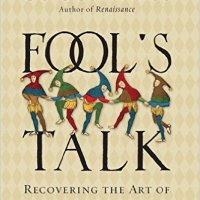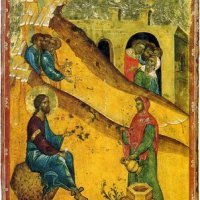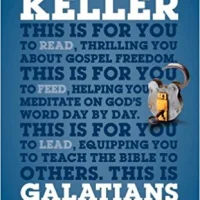 This is a sermon on Luke 3:1-14. Download sermon outline/commentary and audio.
This is a sermon on Luke 3:1-14. Download sermon outline/commentary and audio.
As John the Baptist faithfully discharged his prophetic calling to prepare people to meet God, so must we, called as Christ’s ambassadors and followers, faithfully discharge our duties to repent and bear the fruit of repentance, urging others to do the same, in order to prepare ourselves and others to meet God.
Introduction – There’s a prophet in town! He’s a powerful preacher with an urgent message from God. He says God is coming very soon. He says we need to get ready right now. Who will go see him? (1) I go to church every Sunday and give money, occasionally I read my Bible and pray, and I try to be a good person. But no matter how many good things I do, I don’t feel fulfilled. I don’t get it. (2) I can’t seem to straighten out my life no matter what I do. My past, my friends, my spouse, my job, and my desires always seem to drag me down. I feel like a bad person, and I can’t help blaming God for my life. So I’m stuck in this miserable life. That’s why I treat others poorly. (1&2) But why can’t I shake this nagging thought that God wants more from me? What more could he want? What else do I have to do? (1) Is being religious, having a Christian upbringing, and agreeing that Jesus is Lord enough to please God and find fulfillment? (2) Will God overlook my frustration, and my harsh and indifferent treatment of others since I can’t help myself and besides, everyone else is doing the same? (1&2) What must I do to prepare myself to meet God?
I. The Prophetic Call
A. John’s call as prophet and herald (vv. 1-6)
1. Date. Luke dates John’s ministry in secular and sacred history during the reigns of contemporary rulers and high priests. Note Luke’s historical accuracy is confirmed by extra-biblical sources. The 15th year of Tiberius Caesar, when God called John as a prophet, was A.D. 25/26 or 28/29. The word of the Lord coming to John as a prophet was amazing since Israel’s prophets had been extinct for 460 years. Eighteen years have passed since the last episode in Luke’s gospel. Subsequently Jesus has grown from a boy to a man, from a 12-year-old fledgling adult Jew to a man old enough to teach God’s word. Jesus’ time of preparation is nearing its end. His heavenly Father has prepared Jesus’ human nature for ministry for some thirty years, and now Jesus about to visit his people as their Lord.
2. Call. Luke uses language that places John the Baptist in the long line of true biblical prophets. No wonder they flocked to the wilderness! He was Isaiah’s prophecy coming true (Isa 40:3). He was proof that the old age of the law and promise was coming to a close, and the new age of fulfillment was dawning (Lk 16:16). John was both the fulfiller of prophecy and the last of the pre-Christian prophets. John was the greatest OT prophet according to Jesus (Lk 7:28) because he had the privilege of preparing the way for God’s imminent arrival.
3. Method. How did people in ancient times prepare the king’s way when he arrived from a distant country? Remember the scene in the movie The Princess Bride when Fezzik the giant was trying to get the crowd out of the road so he and his friends could pass. “Hey everybody, move!” And the crowds quickly cleared out of the way. This is the scene that immediately came to my mind, but this is not the case. When kings long ago were about to travel, they would send messengers ahead to clear the roads, repair them, make them passable without trouble, and arrange to bring honor to the king (cf. Lk 19:36-38). John was calling aloud to the crowds to make their hearts and lives ready for the king. We are to respond the same way by focusing our attention on Jesus, listening to his teaching, and responding to him like we tell our children how to obey “right away, all the way, and with a happy heart.”
4. Purpose. Notice the apocalyptic language from Isaiah 40:3-5 describing the prophetic ministry that the prophet heralding the Christ would fulfill. The imagery is of cosmic upheaval, cosmic judgment, and the salvation of God revealed to all flesh (Jew and Gentile; clean and unclean). Obstacles will be removed from the Lord’s path (mountains, valleys, the crooked and rough), the proud will be humbled, and the crooked will be straightened. The call to be saved is universal—extended to people of all nations. If you feel like you are on the outside of God’s grace. That his call doesn’t extend to you because you’ve disqualified yourself because of your past, or your present. Think again. Luke shows us more than all the other gospels that God’s heart is for the outsider, the sinner, the downcast in this world. God’s heart is to bring you near. No one who decides to follow Jesus, confessing their sin and coming to him in repentance and faith, will be excluded from his kingdom, from his table, from his family.
B. The minister’s call as ambassador (2 Cor 5:16-6:2)
Gospel ministers are the “prophets” of today. We don’t make esoteric prognostications like the Nostradamuses of the world. The word of the Lord does not come to us like God spoke to the biblical prophets, so we dare not presume to say, “Thus says the LORD…” But we are ambassadors of Christ, his emissaries sent to his people (you!) to deliver and apply his message of reconciliation. Please do not yawn like you’ve heard all this before, or nod your head in smug agreement, or ignore Christ’s ambassador to check your phone for messages. God says this is the message you need to hear. Please do not receive God’s grace in vain. The message is always urgent because today is the day of salvation. If you turn away and harden your heart, God might just give you that—a hardened heart, one that is cold, isolated, impenetrable, irredeemable.
C. Every Christian’s call as minister (Eph 4:1-3, 11-13; 1 Pet 3:15)
Through teaching, discipleship, and mentoring in the church, God is equipping every believer for the works of ministry to build up the body of Christ. This includes the ambassadorial role of personal evangelist, giving to anyone who asks you for the reason why you hope in Jesus Christ.
A. Repent and be baptized for the forgiveness of sins (v. 3)
1. John’s baptism is not Christian baptism. It was historically prior to, and not as great as, Christian baptism. Christian baptism is a once-received sacrament, yet John’s disciples who later followed Jesus had to receive his baptism. John the Baptist made this distinction clear when he noted the difference between his baptism and Jesus’ baptism (Lk 3:16). John’s baptism is an old covenant symbol building upon the sign of circumcision.
2. John’s “baptism of repentance” was a cleansing ritual that signified the repentant person, washed of defilement, returning to God with the expectation of forgiveness. Jewish religious practice by this time included additional ritual washings originally associated with temple worship (Ex 30:18-21; Num 19:9-22). Jews were “baptizing” proselyte Gentiles as a prerequisite for circumcision as entrance into the covenant community because they viewed Gentiles as spiritually “unclean.” Some fringe Jewish groups required a ritual baptism as a prerequisite for entrance into the remnant community. But John’s baptism was unlike the proselyte and remnant baptisms. Its origin was not of man but of God (Lk 20:1-8). In essence John declared to the Jewish people that God was at their door, and they were not ready. He confronted them with their hearts and lives that were still dirty with sin, and declared that this placed them “outside” of God’s grace, so they needed to take a “bath” to prepare for the coming of the Lord. The nature of repentance is two-fold. It entails turning away from sin in decision and action, and turning toward God in faith. Merely saying sorry and stopping sinful action, resolving to do better is not Christian repentance because it is not God-ward focused and therefore cannot bring forgiveness. Sorry without change is licentiousness and cheap grace. Sorry with change but without God is moralism and pharisaical religion. The Westminster Shorter Catechism 87 says, “Repentance unto life is a saving grace, whereby a sinner, out of a true sense of his sin, and apprehension of the mercy of God in Christ, doth, with grief and hatred of his sin, turn from it unto God, with full purpose of, and endeavour after, new obedience.”
B. Good fruits, not religious heritage nor ritual, are the evidence of salvation (vv. 7-8)
John discerned the hearts of those Jews who had come out to the wilderness to be baptized. Many were outward law-keepers who came to identify with John and participate in the latest spiritual fad of the day. They had no intention of repenting because they trusted in religious heritage (being Jews) and ritual (baptism). They viewed John’s baptism as a vaccination or a fire insurance policy protecting them from God’s wrath, a ritual that could substitute for repentance. They believed their physical ancestry was a substitute for repentance.
This truth is especially important for children and young people to grasp. The faith of your parents will not shield you from God’s wrath. Your upbringing in a Christian home and in the church will not save you from God’s punishment for your sin. Not even your baptism and church membership will ensure your name is written in the Lamb’s Book of Life. You are not a member of the family of God by natural descent. All of these are wonderful blessings of God, graciously given to you, and calling you personally to repent and believe in Jesus Christ for the forgiveness of sins. Do not squander these blessings. Bear the fruit of repentance. Show your repentance by denying yourself to serve God and others.
The people were toying around with the sign of baptism without bothering with the substance of it. John wanted to clear away their self-righteousness, smug complacency, greed, cruelty, and slander (Lk 3:13-14). “The Christ is coming! You believe this but you don’t understand how soon! Stop your lukewarm and half-hearted pursuit of God, living your life selfishly and pursuing your sinful pleasures! God is at the door! He has picked up his axe and laid its head at the tree root. You are that tree! Judgment is imminent. If you don’t bear the fruit of repentance NOW he is about to chop you down and cast you into the fire.”
Wow. This sounds a lot like Jonathan Edwards’ sermon Sinners in the Hands of an Angry God. Many Christians think Edwards went too far with his use of vivid imagery. Many non-Christians think Edwards is hilarious, imagining him as a buffoonish Bible-thumping fundamentalist puritanical preacher. But John the Baptist was the original Jonathan Edwards, and he was right! Judgment was imminent! Jesus Christ was about to bring the kingdom of God, cutting down all the trees that didn’t bear the fruit of repentance. And it is the same today. Because Christ has come, judgment for you is imminent. Paul preached this way to unbelievers (Acts 17:30-31).
C. Time is almost up (v. 9)
The judgment of God is not future anymore. The tree that does not bear good fruit will not be (future tense) cut down and burned. No, such a tree is (present tense) cut down and burned. Judgment is beginning now. In other words, repent because it’s too late to wait!
III. The Prepared Life
John demands that you steward your time, your talent, and your treasure to the glory of God and the good of your neighbor—so that your heart and life are ready for Jesus’ arrival.
A. Share what you have with those who need what you have (vv. 10-11)
John gives a general and practical example of the good fruit of repentance. Repentance is a heart and mind change that necessarily leads to consistent action, helping those truly in needy (the hungry and naked). If a person has only two tunics, then he has a surplus of one that should be shared with the one who has none. You don’t have to be rich to share. If you have one more than is absolutely necessary, then you ought to share. This shows repentance. On the other hand, a person might wear two tunics to keep warm on a journey or to sleep in (Mk 6:9). If John had this in mind, then he commanded the one with two who is warm to sacrifice comfort for the one who is cold.
Remember the movie Dumb and Dumber? It’s a stupid, juvenile, silly movie. I saw it in the theater with college buddies, so it really hit the sweet spot for me. Anyway, the two friends finally bumble their way cross-country with no money to Colorado, the whole time getting on each others’ nerves. In one scene they’re warming their hands by a bonfire in the middle of a snowy winter. Harry has no gloves. The fire isn’t warming his hands enough so he’s visibly shivering. But Lloyd is fine. He’s not even wearing a coat but he’s toasty. Harry: “I’m free-ee-zing Lloyd!” Lloyd: “Here, take these extra pair of gloves. My hands are getting sweaty.” Harry: “Lloyd, I’m going to kill you!”
B. Do your job well, fair, and with contentment (vv. 12-14)
1. Tax collectors had an earned reputation for dishonesty. They routinely collected excess money to pad their wallets. People despised and shunned them. But notice that John legitimizes their occupation. He did not demand they change careers. Instead he commanded them to do their tax collecting honestly, and he left them no room for compromise, delay, or half-way obedience. They must obey John’s command immediately, completely, and with all their heart. You also must go and do likewise! Do not let sin wreak havoc in your life by pampering it or just considering putting it all away. Sin is too destructive for you to trifle with. Substitute the right action for the wrong NOW!
2. Soldiers were prone to loot, and most people had little redress against a soldier using violence or false charges to rob them. They were often disgruntled, unscrupulous, cruel, and even inhumane. John commanded them to avoid these occupational hazards, instead acting uprightly and contentedly. John doesn’t tell them to quit their jobs either. Instead he commands them to discharge their duties honestly and be content with their pay. What does this mean today for folks in various callings and occupations?
For military/law enforcement—Protect the weak, enforce the law, use force to restrain the evildoer, don’t seek personal vengeance against the disrespectful, expose and flee from corruption. For employees—Serve your bosses as you would serve Christ, not with lip service or shoddy work, but with your best effort knowing your reward is from God not men. For employers and bosses—Treat your workers fairly and as equals. Give praise and reward for a job well done. Exercise discipline with grace. Pay fair wages and charge fair prices to make an honest profit. Seek to do the most good rather than to make the most money. For students—Do your work, be honest, and accept the grades you earn. Do not give into the strong temptation to cheat. And for everyone—Do not manipulate others (passively or aggressively) to get what you want. Share of your surplus with those in need. Count righteousness rather than material success as gain.
Conclusion – John the Baptist was a prophet who prepared the way for the Great Prophet, Jesus Christ. His message prepares us to meet God. He was (and is) a herald preparing the way for the Lord’s coming. When Jesus finally arrived, he came with a new message: the gospel of the kingdom. Compared to John’s message, the gospel Jesus preached is exceedingly greater news with exceedingly greater demands. You and I still need the message of John the Baptist to prepare our hearts and lives for the coming of the king, to make us humble and willing servants ready to meet the Lord Jesus, God in the flesh. Let me end with a story, a parable of sorts.
There once were two brothers. The older was proud because he thought he was his father’s favorite. He did his schoolwork, got good grades, did his chores, never missed Sunday School, and basically maintained a clean reputation. But the younger brother thought his father hated him. He grumbled about homework, didn’t care about grades, neglected his chores, goofed off during church, and generally lived in rebellion. Then one day the father and mother announced they would both be away on trips at the same time. The brothers would have a sitter watch them, and the brothers would need to go about their business and be prepared for mom and dad’s return. But the father and mother didn’t tell the brothers when they were coming back, for they wanted them always to be ready. As soon as they left, the older brother said to himself, “Now I can have all the fun I’ve never been able to have!” The younger brother said to himself, “Now I can get away with all the fun I’ve been trying to have!” So they both spent the whole week doing as they pleased. They turned the whole house upside-down by not cleaning up any of their messes. They even fought with each other and the sitter until she left them. When it rained they played in the garden and brought their filthy selves into the house, sloshing mud all over the house. And being boys they refused to bathe. At the end of the week, their mother arrived home first, and when she saw what the brothers had done, she knew it was too late to clean up before their father arrived. So the mother screamed in a panic, “Hurry, your father will be home soon. He will surely be angry. You better prepare yourselves for his arrival!”
The older brother said to himself, “Surely my father won’t think I am responsible. He will blame my brother.” So he undressed, covered his filthy body with clean clothes, and sat down to read his Bible. The younger brother said to himself, “I’m dead! There is no way I’m going to escape my father’s wrath this time. Perhaps he will forgive me if I say I’m sorry and show him that I’ll change my ways.” So the younger brother jumped in the shower, clothes and all, and washed off the mud. Just then, the father arrived at the door and called for his sons. As they both stood before the father, he asked them, “What have you done?” The younger brother spoke first. “I am sorry. I have disobeyed you, father. I have neglected my work and ruined your home. This mess is too big to clean up by myself, but I’ll do my best to please you. Please forgive me.” The father, seeing his soaking-wet son’s feeble effort to prepare himself, smiled on him and loved him. Then the older brother spoke, boasting, “Hey dad, I just finished my devotion! This rebellious son of yours did all this. I didn’t do anything.” The father, seeing his filthy son’s dishonest effort to prepare himself, frowned on him and turned toward the repentant one. “Come on son, let’s go inside and I’ll clean you up. Then we’ll start on this mess together. In disbelief, the older brother, angry and alone, slammed the door and stood outside glaring through the window at his father and younger brother embracing.















